Palliative Care: Advance Care Planning, Ethics, and Legal Framework
VerifiedAdded on 2021/02/20
|8
|1871
|58
Essay
AI Summary
This essay provides a comprehensive overview of palliative care, focusing on advance care planning and its significance in improving the quality of life for terminally ill patients and their families. The essay delves into the concept of advance care planning, including advance directives such as durable power of attorney for health care and living wills, highlighting their importance in respecting patient autonomy and guiding medical decisions. It examines the legal framework in Victoria, Australia, emphasizing the rights of individuals to make healthcare decisions and the role of statute and common law. Furthermore, the essay explores ethical principles related to advance care planning, such as respect, truth-telling, and confidentiality, and addresses ethical dilemmas in communication and medical treatment. It also outlines best practices in preparing and utilizing advance care planning, including therapies like music therapy. The essay concludes by emphasizing the importance of palliative care in providing comfort and support to patients nearing the end of life.
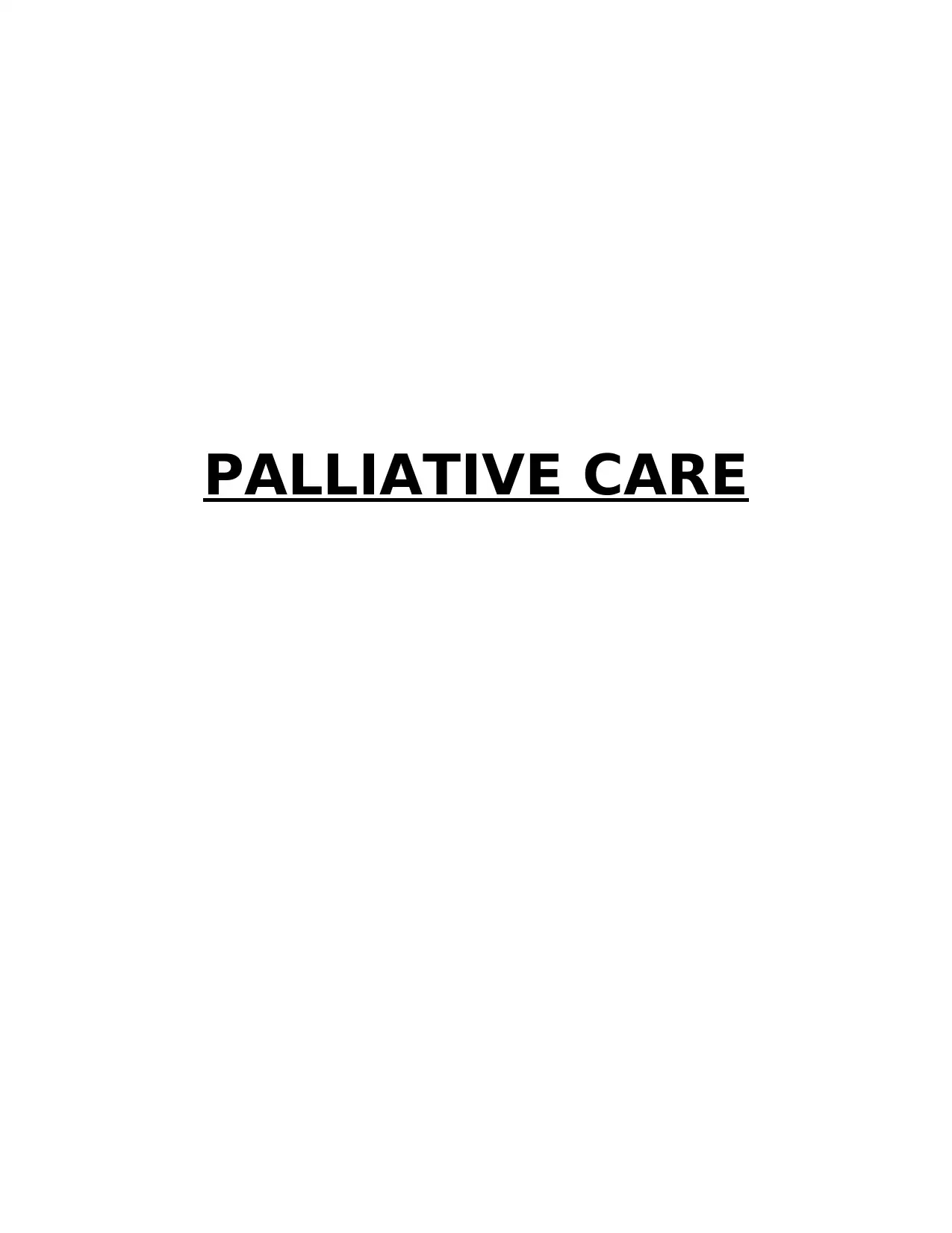
PALLIATIVE CARE
Paraphrase This Document
Need a fresh take? Get an instant paraphrase of this document with our AI Paraphraser
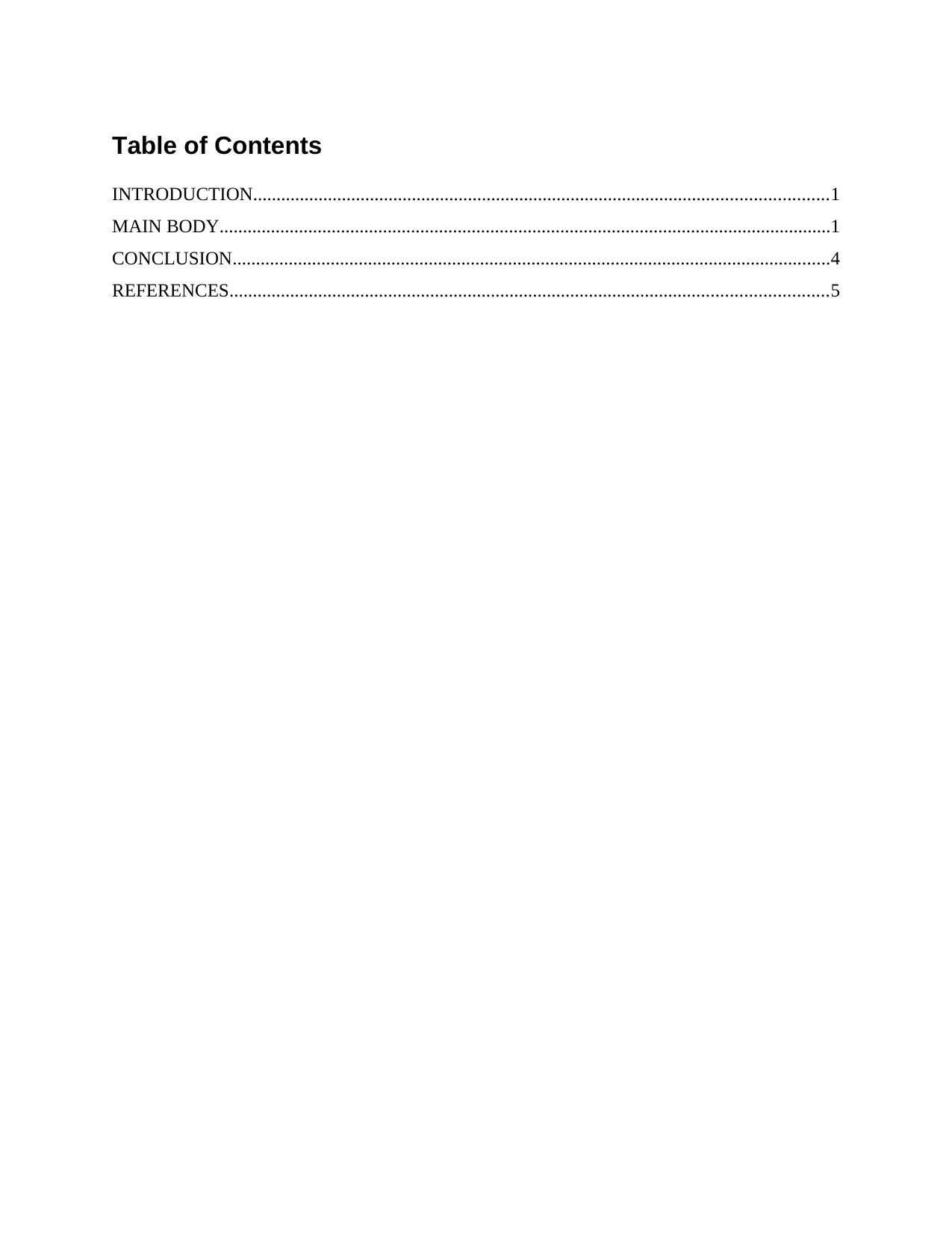
Table of Contents
INTRODUCTION...........................................................................................................................1
MAIN BODY...................................................................................................................................1
CONCLUSION................................................................................................................................4
REFERENCES................................................................................................................................5
INTRODUCTION...........................................................................................................................1
MAIN BODY...................................................................................................................................1
CONCLUSION................................................................................................................................4
REFERENCES................................................................................................................................5
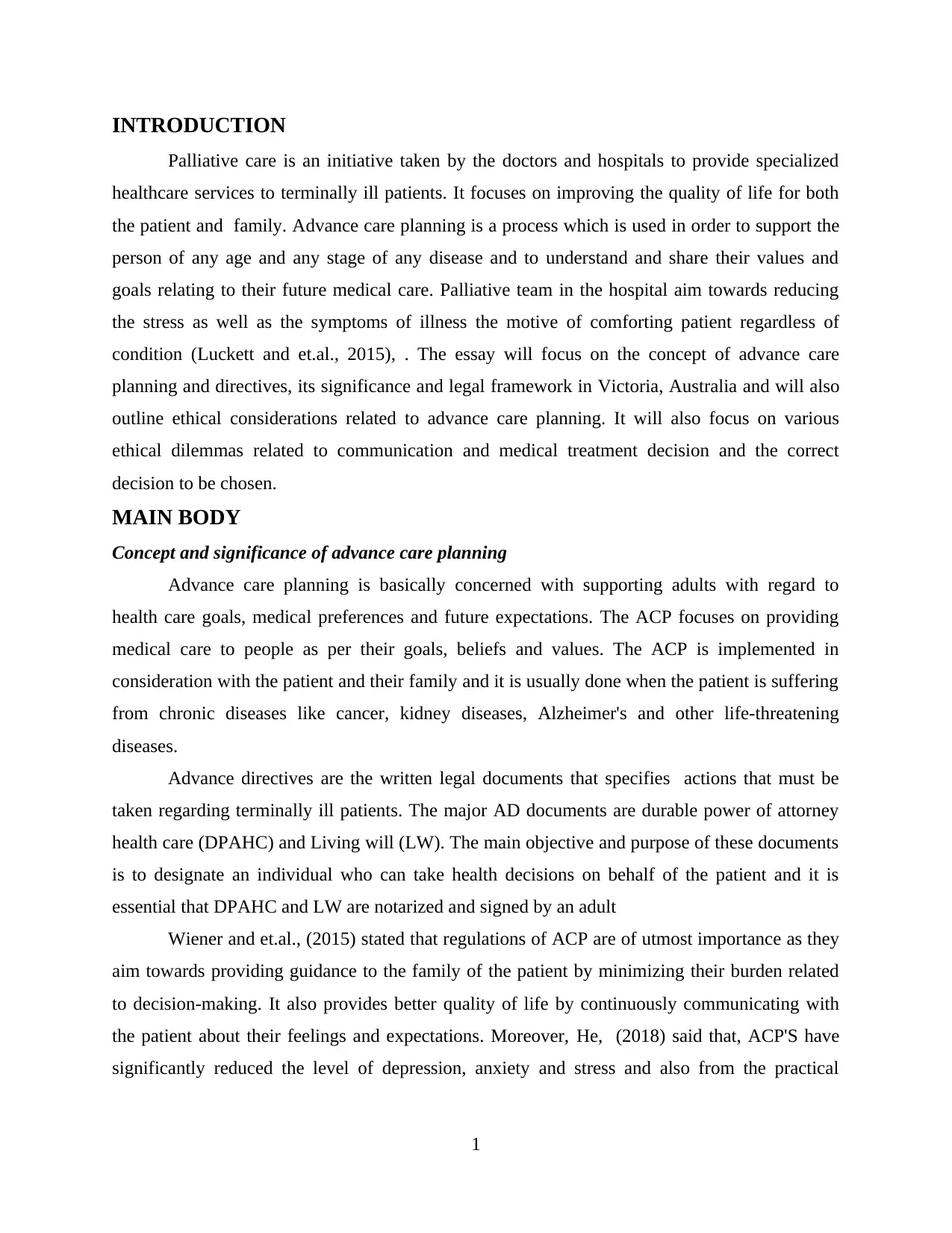
INTRODUCTION
Palliative care is an initiative taken by the doctors and hospitals to provide specialized
healthcare services to terminally ill patients. It focuses on improving the quality of life for both
the patient and family. Advance care planning is a process which is used in order to support the
person of any age and any stage of any disease and to understand and share their values and
goals relating to their future medical care. Palliative team in the hospital aim towards reducing
the stress as well as the symptoms of illness the motive of comforting patient regardless of
condition (Luckett and et.al., 2015), . The essay will focus on the concept of advance care
planning and directives, its significance and legal framework in Victoria, Australia and will also
outline ethical considerations related to advance care planning. It will also focus on various
ethical dilemmas related to communication and medical treatment decision and the correct
decision to be chosen.
MAIN BODY
Concept and significance of advance care planning
Advance care planning is basically concerned with supporting adults with regard to
health care goals, medical preferences and future expectations. The ACP focuses on providing
medical care to people as per their goals, beliefs and values. The ACP is implemented in
consideration with the patient and their family and it is usually done when the patient is suffering
from chronic diseases like cancer, kidney diseases, Alzheimer's and other life-threatening
diseases.
Advance directives are the written legal documents that specifies actions that must be
taken regarding terminally ill patients. The major AD documents are durable power of attorney
health care (DPAHC) and Living will (LW). The main objective and purpose of these documents
is to designate an individual who can take health decisions on behalf of the patient and it is
essential that DPAHC and LW are notarized and signed by an adult
Wiener and et.al., (2015) stated that regulations of ACP are of utmost importance as they
aim towards providing guidance to the family of the patient by minimizing their burden related
to decision-making. It also provides better quality of life by continuously communicating with
the patient about their feelings and expectations. Moreover, He, (2018) said that, ACP'S have
significantly reduced the level of depression, anxiety and stress and also from the practical
1
Palliative care is an initiative taken by the doctors and hospitals to provide specialized
healthcare services to terminally ill patients. It focuses on improving the quality of life for both
the patient and family. Advance care planning is a process which is used in order to support the
person of any age and any stage of any disease and to understand and share their values and
goals relating to their future medical care. Palliative team in the hospital aim towards reducing
the stress as well as the symptoms of illness the motive of comforting patient regardless of
condition (Luckett and et.al., 2015), . The essay will focus on the concept of advance care
planning and directives, its significance and legal framework in Victoria, Australia and will also
outline ethical considerations related to advance care planning. It will also focus on various
ethical dilemmas related to communication and medical treatment decision and the correct
decision to be chosen.
MAIN BODY
Concept and significance of advance care planning
Advance care planning is basically concerned with supporting adults with regard to
health care goals, medical preferences and future expectations. The ACP focuses on providing
medical care to people as per their goals, beliefs and values. The ACP is implemented in
consideration with the patient and their family and it is usually done when the patient is suffering
from chronic diseases like cancer, kidney diseases, Alzheimer's and other life-threatening
diseases.
Advance directives are the written legal documents that specifies actions that must be
taken regarding terminally ill patients. The major AD documents are durable power of attorney
health care (DPAHC) and Living will (LW). The main objective and purpose of these documents
is to designate an individual who can take health decisions on behalf of the patient and it is
essential that DPAHC and LW are notarized and signed by an adult
Wiener and et.al., (2015) stated that regulations of ACP are of utmost importance as they
aim towards providing guidance to the family of the patient by minimizing their burden related
to decision-making. It also provides better quality of life by continuously communicating with
the patient about their feelings and expectations. Moreover, He, (2018) said that, ACP'S have
significantly reduced the level of depression, anxiety and stress and also from the practical
1
⊘ This is a preview!⊘
Do you want full access?
Subscribe today to unlock all pages.

Trusted by 1+ million students worldwide
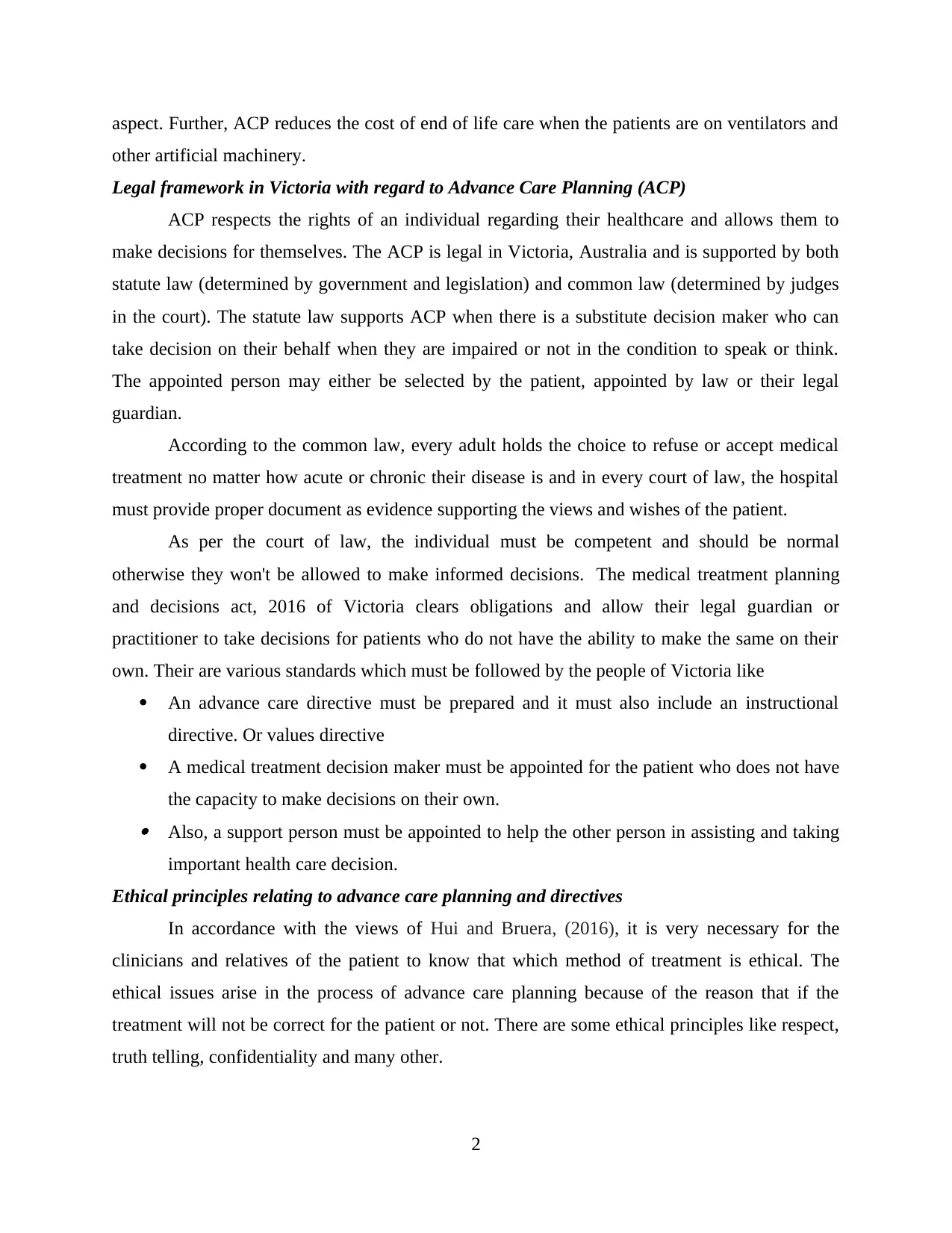
aspect. Further, ACP reduces the cost of end of life care when the patients are on ventilators and
other artificial machinery.
Legal framework in Victoria with regard to Advance Care Planning (ACP)
ACP respects the rights of an individual regarding their healthcare and allows them to
make decisions for themselves. The ACP is legal in Victoria, Australia and is supported by both
statute law (determined by government and legislation) and common law (determined by judges
in the court). The statute law supports ACP when there is a substitute decision maker who can
take decision on their behalf when they are impaired or not in the condition to speak or think.
The appointed person may either be selected by the patient, appointed by law or their legal
guardian.
According to the common law, every adult holds the choice to refuse or accept medical
treatment no matter how acute or chronic their disease is and in every court of law, the hospital
must provide proper document as evidence supporting the views and wishes of the patient.
As per the court of law, the individual must be competent and should be normal
otherwise they won't be allowed to make informed decisions. The medical treatment planning
and decisions act, 2016 of Victoria clears obligations and allow their legal guardian or
practitioner to take decisions for patients who do not have the ability to make the same on their
own. Their are various standards which must be followed by the people of Victoria like
An advance care directive must be prepared and it must also include an instructional
directive. Or values directive
A medical treatment decision maker must be appointed for the patient who does not have
the capacity to make decisions on their own. Also, a support person must be appointed to help the other person in assisting and taking
important health care decision.
Ethical principles relating to advance care planning and directives
In accordance with the views of Hui and Bruera, (2016), it is very necessary for the
clinicians and relatives of the patient to know that which method of treatment is ethical. The
ethical issues arise in the process of advance care planning because of the reason that if the
treatment will not be correct for the patient or not. There are some ethical principles like respect,
truth telling, confidentiality and many other.
2
other artificial machinery.
Legal framework in Victoria with regard to Advance Care Planning (ACP)
ACP respects the rights of an individual regarding their healthcare and allows them to
make decisions for themselves. The ACP is legal in Victoria, Australia and is supported by both
statute law (determined by government and legislation) and common law (determined by judges
in the court). The statute law supports ACP when there is a substitute decision maker who can
take decision on their behalf when they are impaired or not in the condition to speak or think.
The appointed person may either be selected by the patient, appointed by law or their legal
guardian.
According to the common law, every adult holds the choice to refuse or accept medical
treatment no matter how acute or chronic their disease is and in every court of law, the hospital
must provide proper document as evidence supporting the views and wishes of the patient.
As per the court of law, the individual must be competent and should be normal
otherwise they won't be allowed to make informed decisions. The medical treatment planning
and decisions act, 2016 of Victoria clears obligations and allow their legal guardian or
practitioner to take decisions for patients who do not have the ability to make the same on their
own. Their are various standards which must be followed by the people of Victoria like
An advance care directive must be prepared and it must also include an instructional
directive. Or values directive
A medical treatment decision maker must be appointed for the patient who does not have
the capacity to make decisions on their own. Also, a support person must be appointed to help the other person in assisting and taking
important health care decision.
Ethical principles relating to advance care planning and directives
In accordance with the views of Hui and Bruera, (2016), it is very necessary for the
clinicians and relatives of the patient to know that which method of treatment is ethical. The
ethical issues arise in the process of advance care planning because of the reason that if the
treatment will not be correct for the patient or not. There are some ethical principles like respect,
truth telling, confidentiality and many other.
2
Paraphrase This Document
Need a fresh take? Get an instant paraphrase of this document with our AI Paraphraser
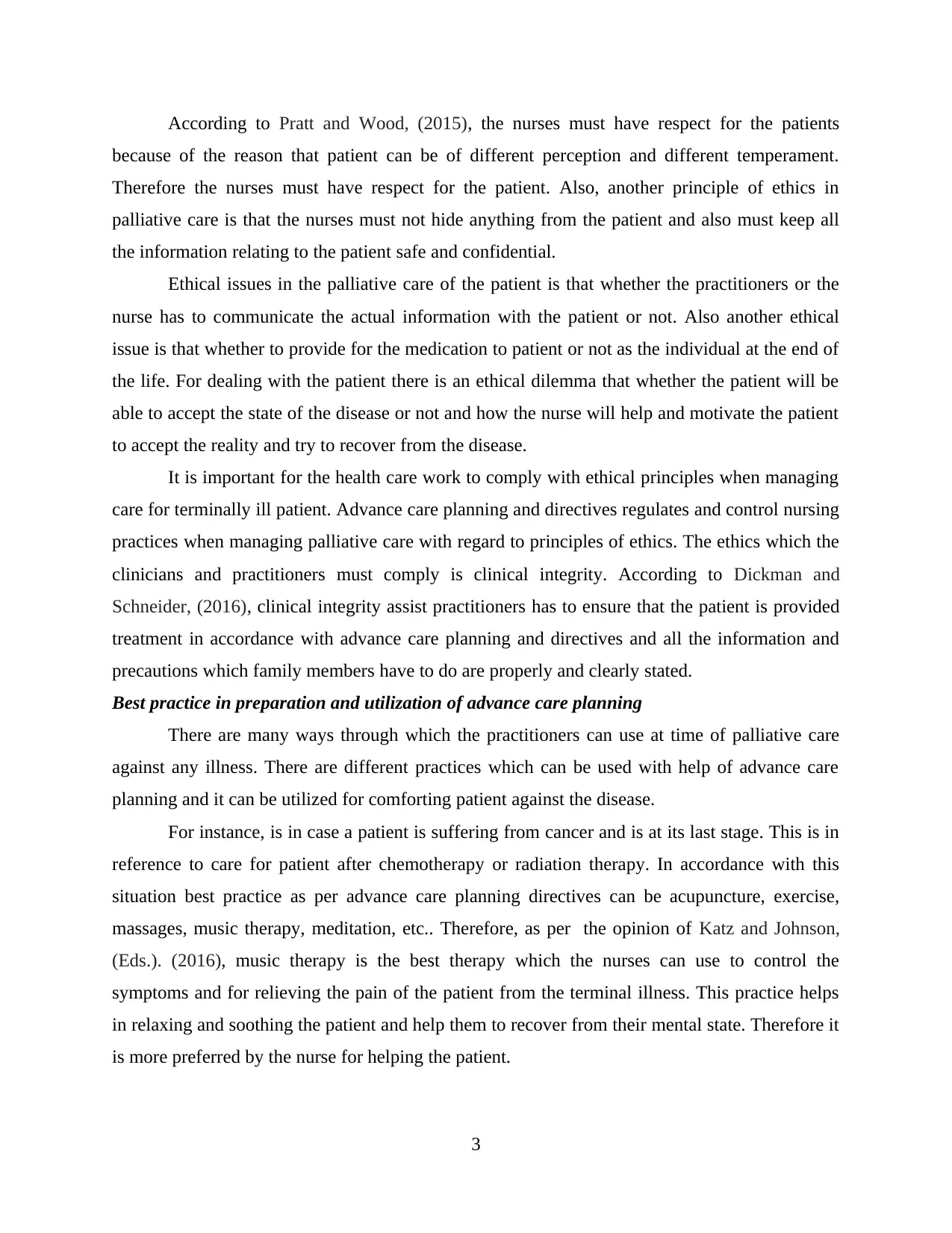
According to Pratt and Wood, (2015), the nurses must have respect for the patients
because of the reason that patient can be of different perception and different temperament.
Therefore the nurses must have respect for the patient. Also, another principle of ethics in
palliative care is that the nurses must not hide anything from the patient and also must keep all
the information relating to the patient safe and confidential.
Ethical issues in the palliative care of the patient is that whether the practitioners or the
nurse has to communicate the actual information with the patient or not. Also another ethical
issue is that whether to provide for the medication to patient or not as the individual at the end of
the life. For dealing with the patient there is an ethical dilemma that whether the patient will be
able to accept the state of the disease or not and how the nurse will help and motivate the patient
to accept the reality and try to recover from the disease.
It is important for the health care work to comply with ethical principles when managing
care for terminally ill patient. Advance care planning and directives regulates and control nursing
practices when managing palliative care with regard to principles of ethics. The ethics which the
clinicians and practitioners must comply is clinical integrity. According to Dickman and
Schneider, (2016), clinical integrity assist practitioners has to ensure that the patient is provided
treatment in accordance with advance care planning and directives and all the information and
precautions which family members have to do are properly and clearly stated.
Best practice in preparation and utilization of advance care planning
There are many ways through which the practitioners can use at time of palliative care
against any illness. There are different practices which can be used with help of advance care
planning and it can be utilized for comforting patient against the disease.
For instance, is in case a patient is suffering from cancer and is at its last stage. This is in
reference to care for patient after chemotherapy or radiation therapy. In accordance with this
situation best practice as per advance care planning directives can be acupuncture, exercise,
massages, music therapy, meditation, etc.. Therefore, as per the opinion of Katz and Johnson,
(Eds.). (2016), music therapy is the best therapy which the nurses can use to control the
symptoms and for relieving the pain of the patient from the terminal illness. This practice helps
in relaxing and soothing the patient and help them to recover from their mental state. Therefore it
is more preferred by the nurse for helping the patient.
3
because of the reason that patient can be of different perception and different temperament.
Therefore the nurses must have respect for the patient. Also, another principle of ethics in
palliative care is that the nurses must not hide anything from the patient and also must keep all
the information relating to the patient safe and confidential.
Ethical issues in the palliative care of the patient is that whether the practitioners or the
nurse has to communicate the actual information with the patient or not. Also another ethical
issue is that whether to provide for the medication to patient or not as the individual at the end of
the life. For dealing with the patient there is an ethical dilemma that whether the patient will be
able to accept the state of the disease or not and how the nurse will help and motivate the patient
to accept the reality and try to recover from the disease.
It is important for the health care work to comply with ethical principles when managing
care for terminally ill patient. Advance care planning and directives regulates and control nursing
practices when managing palliative care with regard to principles of ethics. The ethics which the
clinicians and practitioners must comply is clinical integrity. According to Dickman and
Schneider, (2016), clinical integrity assist practitioners has to ensure that the patient is provided
treatment in accordance with advance care planning and directives and all the information and
precautions which family members have to do are properly and clearly stated.
Best practice in preparation and utilization of advance care planning
There are many ways through which the practitioners can use at time of palliative care
against any illness. There are different practices which can be used with help of advance care
planning and it can be utilized for comforting patient against the disease.
For instance, is in case a patient is suffering from cancer and is at its last stage. This is in
reference to care for patient after chemotherapy or radiation therapy. In accordance with this
situation best practice as per advance care planning directives can be acupuncture, exercise,
massages, music therapy, meditation, etc.. Therefore, as per the opinion of Katz and Johnson,
(Eds.). (2016), music therapy is the best therapy which the nurses can use to control the
symptoms and for relieving the pain of the patient from the terminal illness. This practice helps
in relaxing and soothing the patient and help them to recover from their mental state. Therefore it
is more preferred by the nurse for helping the patient.
3
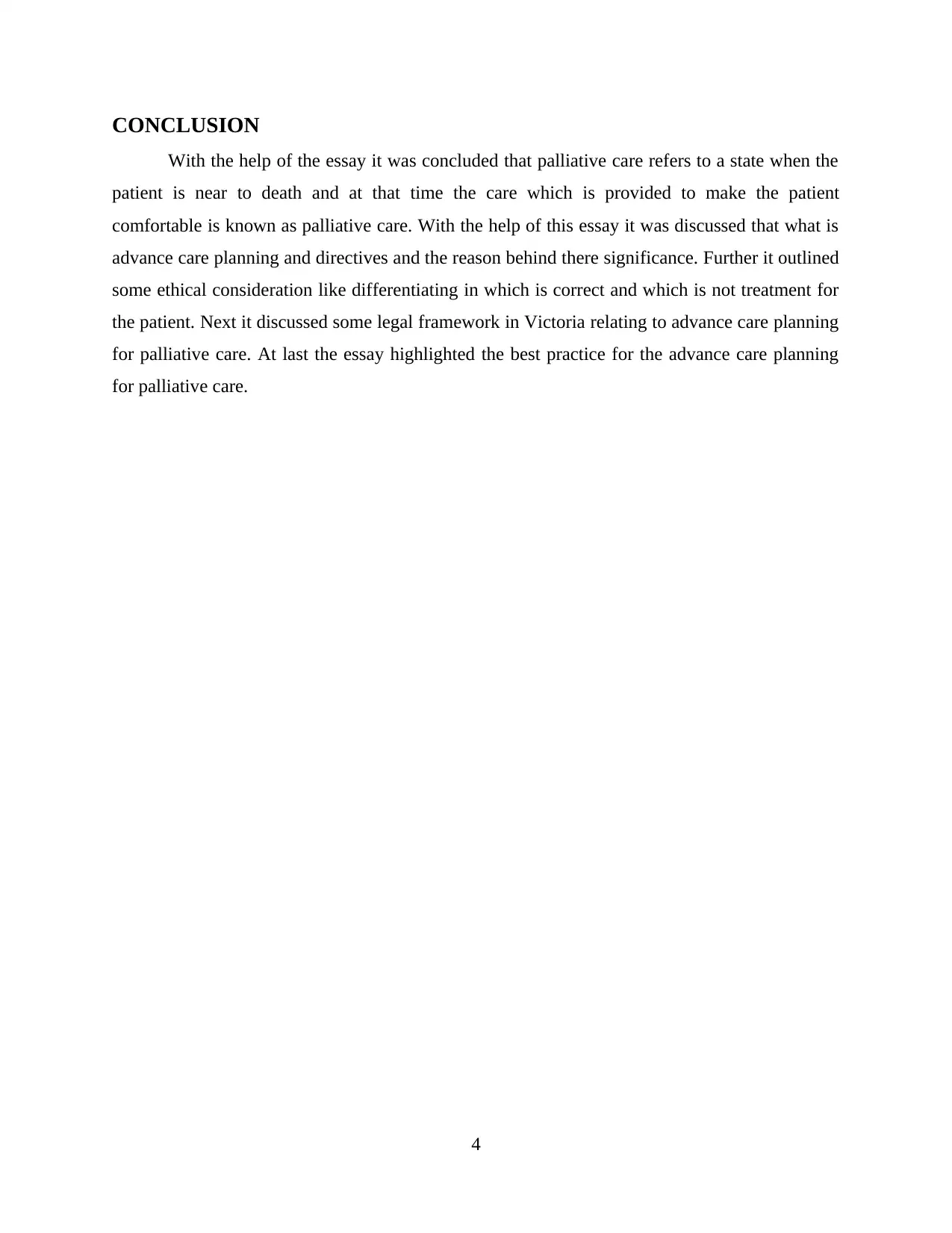
CONCLUSION
With the help of the essay it was concluded that palliative care refers to a state when the
patient is near to death and at that time the care which is provided to make the patient
comfortable is known as palliative care. With the help of this essay it was discussed that what is
advance care planning and directives and the reason behind there significance. Further it outlined
some ethical consideration like differentiating in which is correct and which is not treatment for
the patient. Next it discussed some legal framework in Victoria relating to advance care planning
for palliative care. At last the essay highlighted the best practice for the advance care planning
for palliative care.
4
With the help of the essay it was concluded that palliative care refers to a state when the
patient is near to death and at that time the care which is provided to make the patient
comfortable is known as palliative care. With the help of this essay it was discussed that what is
advance care planning and directives and the reason behind there significance. Further it outlined
some ethical consideration like differentiating in which is correct and which is not treatment for
the patient. Next it discussed some legal framework in Victoria relating to advance care planning
for palliative care. At last the essay highlighted the best practice for the advance care planning
for palliative care.
4
⊘ This is a preview!⊘
Do you want full access?
Subscribe today to unlock all pages.

Trusted by 1+ million students worldwide
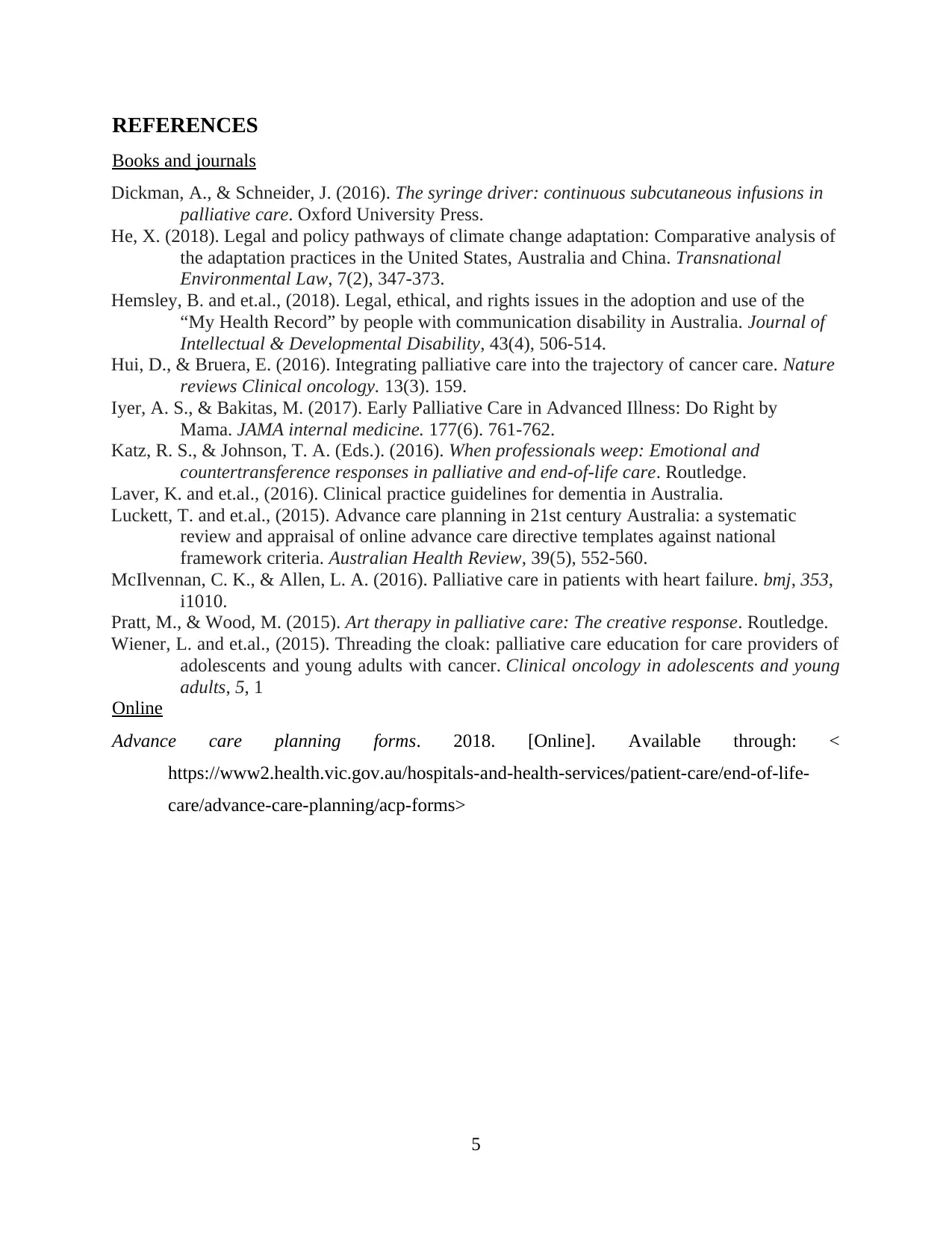
REFERENCES
Books and journals
Dickman, A., & Schneider, J. (2016). The syringe driver: continuous subcutaneous infusions in
palliative care. Oxford University Press.
He, X. (2018). Legal and policy pathways of climate change adaptation: Comparative analysis of
the adaptation practices in the United States, Australia and China. Transnational
Environmental Law, 7(2), 347-373.
Hemsley, B. and et.al., (2018). Legal, ethical, and rights issues in the adoption and use of the
“My Health Record” by people with communication disability in Australia. Journal of
Intellectual & Developmental Disability, 43(4), 506-514.
Hui, D., & Bruera, E. (2016). Integrating palliative care into the trajectory of cancer care. Nature
reviews Clinical oncology. 13(3). 159.
Iyer, A. S., & Bakitas, M. (2017). Early Palliative Care in Advanced Illness: Do Right by
Mama. JAMA internal medicine. 177(6). 761-762.
Katz, R. S., & Johnson, T. A. (Eds.). (2016). When professionals weep: Emotional and
countertransference responses in palliative and end-of-life care. Routledge.
Laver, K. and et.al., (2016). Clinical practice guidelines for dementia in Australia.
Luckett, T. and et.al., (2015). Advance care planning in 21st century Australia: a systematic
review and appraisal of online advance care directive templates against national
framework criteria. Australian Health Review, 39(5), 552-560.
McIlvennan, C. K., & Allen, L. A. (2016). Palliative care in patients with heart failure. bmj, 353,
i1010.
Pratt, M., & Wood, M. (2015). Art therapy in palliative care: The creative response. Routledge.
Wiener, L. and et.al., (2015). Threading the cloak: palliative care education for care providers of
adolescents and young adults with cancer. Clinical oncology in adolescents and young
adults, 5, 1
Online
Advance care planning forms. 2018. [Online]. Available through: <
https://www2.health.vic.gov.au/hospitals-and-health-services/patient-care/end-of-life-
care/advance-care-planning/acp-forms>
5
Books and journals
Dickman, A., & Schneider, J. (2016). The syringe driver: continuous subcutaneous infusions in
palliative care. Oxford University Press.
He, X. (2018). Legal and policy pathways of climate change adaptation: Comparative analysis of
the adaptation practices in the United States, Australia and China. Transnational
Environmental Law, 7(2), 347-373.
Hemsley, B. and et.al., (2018). Legal, ethical, and rights issues in the adoption and use of the
“My Health Record” by people with communication disability in Australia. Journal of
Intellectual & Developmental Disability, 43(4), 506-514.
Hui, D., & Bruera, E. (2016). Integrating palliative care into the trajectory of cancer care. Nature
reviews Clinical oncology. 13(3). 159.
Iyer, A. S., & Bakitas, M. (2017). Early Palliative Care in Advanced Illness: Do Right by
Mama. JAMA internal medicine. 177(6). 761-762.
Katz, R. S., & Johnson, T. A. (Eds.). (2016). When professionals weep: Emotional and
countertransference responses in palliative and end-of-life care. Routledge.
Laver, K. and et.al., (2016). Clinical practice guidelines for dementia in Australia.
Luckett, T. and et.al., (2015). Advance care planning in 21st century Australia: a systematic
review and appraisal of online advance care directive templates against national
framework criteria. Australian Health Review, 39(5), 552-560.
McIlvennan, C. K., & Allen, L. A. (2016). Palliative care in patients with heart failure. bmj, 353,
i1010.
Pratt, M., & Wood, M. (2015). Art therapy in palliative care: The creative response. Routledge.
Wiener, L. and et.al., (2015). Threading the cloak: palliative care education for care providers of
adolescents and young adults with cancer. Clinical oncology in adolescents and young
adults, 5, 1
Online
Advance care planning forms. 2018. [Online]. Available through: <
https://www2.health.vic.gov.au/hospitals-and-health-services/patient-care/end-of-life-
care/advance-care-planning/acp-forms>
5
Paraphrase This Document
Need a fresh take? Get an instant paraphrase of this document with our AI Paraphraser

6
1 out of 8
Related Documents
Your All-in-One AI-Powered Toolkit for Academic Success.
+13062052269
info@desklib.com
Available 24*7 on WhatsApp / Email
![[object Object]](/_next/static/media/star-bottom.7253800d.svg)
Unlock your academic potential
Copyright © 2020–2026 A2Z Services. All Rights Reserved. Developed and managed by ZUCOL.





